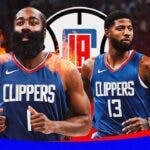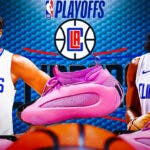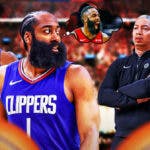It's been eight months since James Harden was traded to the Brooklyn Nets. Because of how far the draft picks involved convey, this is the kind of trade that will take a decade to properly evaluate. However, we do have the freedom to periodically revisit how the trade looks from both perspectives.
Unless something devastating happens, the Brooklyn Nets are always going to be satisfied with the move. When you acquire one of the 25 greatest players of all time in his prime, it's hard to be upset at what the price tag is. The Nets also kept both Kyrie Irving and Kevin Durant so they're the prohibitive title favorites in the NBA right now. If Harden meaningfully helps Brooklyn reach the greatest heights of the playoffs for several seasons, this goes in the win column.
The picks
For Houston, however, it's a little more complicated. You only get to trade an MVP caliber player in his prime once. It's the kind of thing that could handicap the franchise tremendously and cost you your job if you screw it up. At the time, because of the amount of unprotected first round picks and pick swaps, it looked like a no brainer. In fact, that's exactly what I said.
If Brooklyn is really offering Houston four first rounders and three pick swaps… I don't know who's beating that. That might top a logical Ben Simmons offer.
— Salman Ali (@SalmanAliNBA) January 13, 2021
Nothing has changed on that front. It's an ungodly amount of draft capital to acquire and Houston placed a premium on future draft picks after their failed Russell Westbrook trade. Because the picks are so hard into the future, it's hard to gauge their value right now.
However, the high end of outcomes for Houston does involve Brooklyn's big three breaking up. Since the trade, Kevin Durant signed a long-term contract extension. Nets GM Sean Marks believes Harden and Irving will sign their own extensions before the season starts. If true, this high end range has taken a significant hit.
There is still an avenue for some of these picks and/or swaps to end up in the high end though – injury related regression. If Brooklyn has a brutal season of injuries in the mid 2020s, it could net Houston a top pick in the draft. It's hard to know the likelihood of Brooklyn avoiding a derailing season like this in the next five to six seasons, but it's not nothing.
While it's true that Durant, Harden, and Irving turn 33, 32, and 29 by the end of this month respectively, they're all fantastic shooters. History says players like this age much more gracefully than guys who rely on elite athleticism. Because of this, I would place age-related regression in the medium range of outcomes.
All three stars also have great trade value so it's hard to see Brooklyn not getting a good return if they ask out. They would almost certainly aim for players that help immediate winning to protect against giving a top pick to Houston. For this reason, I would also put this scenario in the medium range of outcomes.
I don't believe there is a low range of outcomes here for the picks. There is a layer of protection that comes from controlling a team's draft picks for seven years. Brooklyn will almost assuredly owe at least one lottery pick to Houston at some point during this stretch. Houston could also package these picks for a star player somewhere down the line.
The players
What makes the James Harden trade so controversial is not the draft capital Houston received. Rather, it's the players the Rockets didn't acquire that's garnered the bulk of the criticism. It's indisputable at this point – they could have had Ben Simmons and elected not to do so.
In a vacuum, the decision is defensible. A godfather package of first rounders is more valuable than a player that isn't capable of being the best player on a championship team. After his most recent playoff performance, it's debatable if Simmons can even be the second best player on such a team. However, he is really talented and it is possible he ends up being better than any player Houston drafts with these Brooklyn picks.
This isn't where the controversy ends, however. Houston didn't just take Brooklyn's best offer – they modified it to a deal they thought was superior. Instead of accepting Caris LaVert as the biggest piece of matching salary, the Rockets turned around and traded him to Indiana for Victor Oladipo. The Rockets believed at the time that they could restore Oladipo's value in Houston and his end value would trump LaVert.
It obviously didn't work out that way.
Oladipo was a shot chucker in Houston that didn't seem to be interested in playing defense. The Rockets ended up trading him for the expiring salary of Kelly Olynyk a few months later. It was very clear by the end of Oladipo's tenure that they should have just taken LaVert. Even if he wasn't part of their long-term plans, LaVert is someone who would have netted Houston even more first round picks.
Oladipo being bad may have enabled them to have the worst record in basketball, win the second pick in the draft, and select Jalen Green. However, it's pretty convoluted to suggest this was the Rockets' master plan at work. Their actions and words indicated that they intended to remain competitive. Things worked out for them in the end despite the mistake.
No team plans to bank on a 52% chance of keeping their pick, particularly the Rockets.
As of this moment, the Rockets have Daniel Theis (via trade exception) and Dante Exum as players to show for the James Harden trade. Even if you believe they picked the right trade, it's hard to argue that they didn't fumble the execution.
I happen to believe Houston did right by selecting the bundle of picks over Ben Simmons. However, it does look more like a mystery box than it did eight months ago. Time will tell if it ultimately works out for them.




